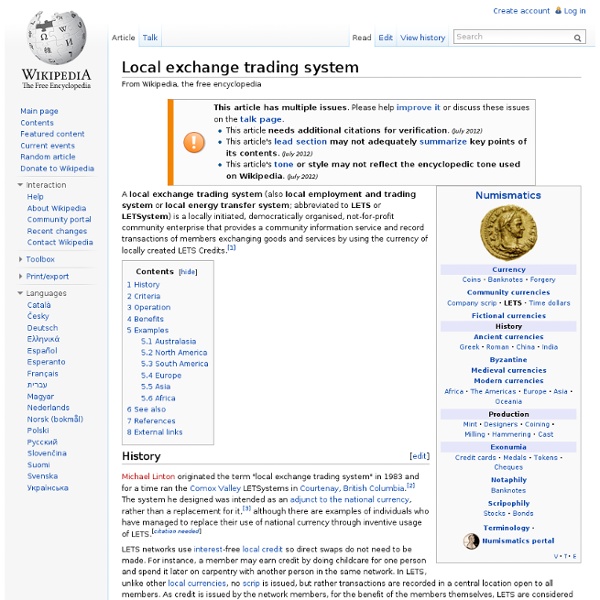Freiwirtschaft
Freiwirtschaft (German for free economy) is an economic idea founded by Silvio Gesell in 1916. He called it Natürliche Wirtschaftsordnung (natural economic order). In 1932, a group of Swiss businessmen used his ideas to found WIR Bank (WIR). Structure[edit] Freiwirtschaft consists of three central aspects, usually summed up as The Three Fs: The (proposed) results include: History[edit] The basic economic ideas of Freiwirtschaft were published in 1890 by the Hungarian-Austrian economist Theodor Hertzka in his novel Freiland - ein soziales Zukunftsbild[1] (Freeland - A Social Anticipation).[2] Flaws of the monetary system[edit] Freiwirtschaft claims that current monetary systems are flawed. This is not the case in the financial markets. References[edit] Jump up ^ Theodor Hertzka: Freiland - ein soziales Zukunftsbild, Leipzig 1890 Summary on the website of the Otto-Lilienthal-MuseumJump up ^ Theodor Hertzka: Freeland - A Social Anticipation, St. External links[edit]
Community currency
A Community Currency is often used as synonym for complementary currency, local currency, regional currency, alternative currency, auxiliary currencies, and private currencies. The debate is not easy to solve at the moment, since the words have different meanings to different people. All are currencies that have different designs and serve different purposes than our conventional money. They depart from the notion that money is essentially a human invention and instrument to influence the relations between citizens and organizations. A solid theoretical framework legitimizes this idea and in the past hundred years a lot of experimentation and experience was picked up with realizing social goals by the implementation of community currencies. Community Currency describes currencies that are used by groups with a common bond, like members of a locality, or association.Complementary currency describes a currency that exists as a supplement to our conventional (national) money.
Welkom bij Torekes! | Torekes
In de wijk Rabot-Blaisantvest in Gent belonen we inzet voor mooie straten, propere pleinen of een beter milieu met een eigen munt: het Toreke. Op deze site ontdek je wat er te doen is voor het milieu en de buurt en Torekes oplevert. De biljetten van 1 en 10 Torekes zijn echt iets waard. Wil je weten hoe Torkes eruitzien, wat je er mee kan doen of hoe je ze kan verdienen?
4 Bitcoin-Newbies: What I have learned about BTC in 4 months
Geschenkenconomie katalyseert gemeenschapszin
“De economie van de toekomst is gebaseerd op relaties in plaats van op bezit.” —John Perry Barlow Antropologen ontdekten dat gemeenschapszin niet noodzakelijk voortkomt uit nabijheid—een wolkenkrabber met 200 appartementen in een grote stad leidt bijna nooit tot een gemeenschap. Evenmin leiden een gemeenschappelijke taal, godsdienst, cultuur, zelfs bloed, automatisch tot een gemeenschap. Al deze factoren helpen wel in het proces, maar het belangrijkste element is iets anders. Antropologen hebben gemerkt dat gemeenschapszin is gebaseerd op wederkerigheid in het uitwisselen van geschenken. Het schenken van een doos spijkers van de ene buurman aan de andere omdat de andere net om verlegen zit is een daad die gemeenschapszin bouwt. Het proces van schenken schept iets dat geldruil niet doet. De etymologie van het woord gemeenschapszin of communiteit komt van twee Latijnse bronnen: cum, wat ‘samen’ onder elkaar’ betekent; en munus, ‘de gift’, of het bijbehorende werkwoord ‘munere, ‘geven’.
Alternative currency
An alternative currency (or private currency) is any currency used as an alternative to the dominant national or multinational currency systems (usually referred to as national or fiat money). They are created by an individual, corporation, or organization, they can be created by national, state, or local governments, or they can arise naturally as people begin to use a certain commodity as a currency. Mutual credit is a form of alternative currency, and thus any form of lending that does not go through the banking system can be considered a form of alternative currency. When used in combination with or when designed to work in combination with national or multinational fiat currencies they can be referred to as complementary currency. Most complementary currencies are also local currencies and are limited to a certain region. Barters are another type of alternative currency. Often there are issues related to paying tax. List of alternative currencies[edit] Advantages[edit] See also[edit]
WIR Bank
WIR Bank logo The WIR Bank, formerly the Swiss Economic Circle (GER: Wirtschaftsring-Genossenschaft), or WIR, is an independent complementary currency system in Switzerland that serves businesses in hospitality, construction, manufacturing, retail and professional services. WIR issues and manages a private currency, called the WIR Franc, which is used, in combination with Swiss Franc to generate dual-currency transactions. WIR was founded in 1934 by businessmen Werner Zimmermann and Paul Enz as a result of currency shortages and global financial instability. "WIR" is both an abbreviation of Wirtschaftsring and the word for "we" in German, reminding participants that the economic circle is also a community.[2] According to the cooperative's statutes, "Its purpose is to encourage participating members to put their buying power at each other's disposal and keep it circulating within their ranks, thereby providing members with additional sales volume." References[edit] External links[edit]



